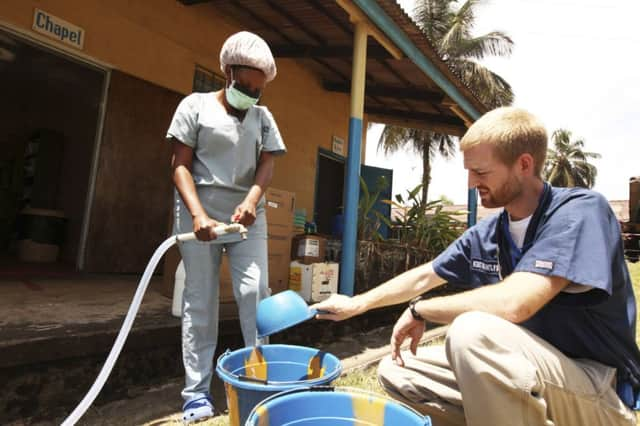UK border guards ill-prepared for ebola


As the number of people killed by the disease in West Africa passed 700, union officials said staff were worried about the risk and what they should do if a traveller was suspected of being infected.
Immigration Service Union general-secretary Lucy Moreton said members had highlighted that there are no containment facilities at ports or airports.
Advertisement
Hide AdAdvertisement
Hide AdShe said: “They serve on the front line – they are the first point of contact for people coming off an aircraft and the concern is what do they do if they’re confronted with someone that doesn’t appear well.
“There is no health facility at the border, there is no containment facility and until extremely recently there has been no guidance issued to staff at all as to what they should do.”
Ms Moreton said the union was unable to give worried members guidance on how to protect themselves.
Foreign Secretary Philip Hammond sought to reassure the public saying it was “most unlikely” ebola could spread in the UK. He said the outbreak was a “very serious threat”, and health experts had met to discuss the possibility of people contracting the virus in West Africa and falling sick here.
In Scotland, public health officials and the Scottish Government said NHS staff had been advised to be alert to specific symptoms. The advisory body Health Protection Scotland (HPS) has issued guidance to the NHS, but said the risk remained very low.
The agency said that with increased numbers of visitors for events such as the Commonwealth Games in Glasgow and the Edinburgh festivals, it had written to front-line healthcare staff to remind them of the need to remain vigilant. But no specific testing regime had been introduced to check travellers.
An HPS spokesman said “Although it is extremely unlikely that a patient infected with ebola would arrive in the UK, we have raised awareness within the NHS and provided a protocol for the investigation and management of the disease.”
A Scottish Government spokeswoman added: “Ebola poses a very low risk to Scotland, and we have been working with HPS to monitor this situation since the outbreak began.
Advertisement
Hide AdAdvertisement
Hide Ad“Scotland has a robust health protection surveillance system which ensures we are fully prepared to respond to such situations.”
The World Health Organisation said yesterday that the outbreak in West Africa had infected more than 1,300 people and killed at least 729. The outbreak has centred on Sierra Leone, Liberia and Guinea. Sierra Leone’s president, Ernest Bai Koroma, has declared a health emergency.
Professor Peter Piot, part of the team that discovered the virus in 1976, said that the likelihood the epidemic could spread in the UK was “very, very, very low”.
Prof Piot, now director of the London School of Hygiene and Tropical Medicine, said: “When you have ebola, frankly you can’t travel you are so sick – it’s the incubation time when people can enter the country.
“Here, because of our infection control and standards in hospitals, I think that the likelihood that would give rise to an epidemic is very, very, very low.
“Even then you still need close contact. It’s not like tuberculosis or Sars or the flu – that you can catch on a bus, but not ebola.”